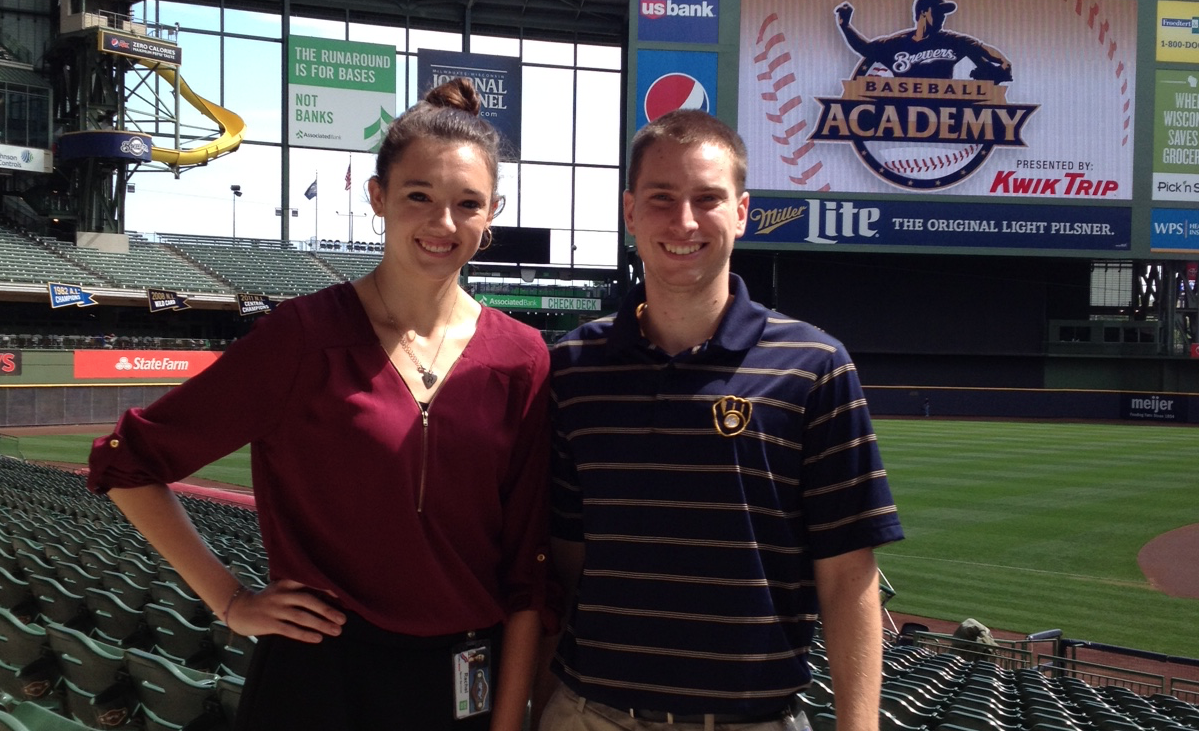
Internships are a huge component of programs at UW-Stevens Point. In most majors, in-field experience is required for graduation, and if it is not required, professors and advisors highly recommend it!
Rachel Gasper is a senior at UW-Stevens Point. She is majoring in natural resource planning with minors in business administration and sustainable energy. The New Berlin, Wisconsin native is very involved on campus. She is the Women’s Club Volleyball President, on the leadership team for Athletes in Action, actively involved in Love Your Melon, and works as a referee for Intramural sports.
This past summer, between Rachel’s third and fourth year at UW-Stevens Point, she gained experience as a concessions intern for Milwaukee SportsService at Miller Park .
I sat down with Rachel to find out more about her internship experience and what advice she had to offer to other students.
Q: How did you find your internship position?
Previously I had worked summers at Miller Park. During high school, I walked around and sold concessions. Yes the “get your cotton candy here” girl. My previous boss told me to come to re-hire training, where I found out about the concessions intern position held at Miller Park. After discussing my major at UW-Stevens Point, they hired me as a concessions intern with a focus on sustainability and business aspects.
Q: Is an internship required for your major?
Yes. Before you graduate, about 300 to 400 hours of in-field experience are required. That is why I did the internship over the summer, so I could work 40 hours a week without it impacting my studies during the school year.
Q: What was your application process like?
I told my previous boss I was interested in the job, provided a resume and completed a formal interview with people I had already worked with. It was pretty traditional.
Q: What were your responsibilities?
I had two sides to my position, the business side and the sustainability side. On the business side I did inventory, stand sheets/binders, and the check in and out of employees. I was a supervisor of many employees and supervised half of a level at the stadium. On the sustainability side, I researched and proposed ideas to help the stadium become more green. One of my ideas was to research a community garden and how it could be helpful to the citizens of Milwaukee.
Q: What was your biggest challenge during your internship?
Realizing that in my position I could not do it all. I could provide awesome ideas that would really help the company and the area become more sustainable, but they wouldn’t get implemented as quickly as I’d have liked.
Q: What was your biggest take away from the internship?
On the business side, it was how important it is to work on a team. It is so much easier to be good at your job when you have wonderful co-workers to help you. Also, don’t underestimate how far thank-you’s can go.
Q: What advice would you give students interested in taking on an internship?
I have four tips:
- Even though you’re an intern, at the bottom of the totem pole, you can still make a difference.
- You must be willing to work long, hard hours. But hard work pays off in the end.
- Don’t complain on the job.
- Just because you do an internship in one area, doesn’t mean you must do that for the rest of your life. It’s about you learning. Take the chance and learn!
Q: Was there a lot of pressure working for such a large and popular organization?
Yes. Not because it is large, but because everyone can see what you do. About 45,000-some people come to every home game. If I made a mistake, everyone could see it.
Q: Was your internship paid or unpaid? Would this have made a difference?
Yes, mine was paid and yes, it made a difference. I spent a lot of hours and did lots of work. If you are thinking about an unpaid internship, be sure to weigh your options.
Q: When in your academic career did you do your internship? And would you recommend this?
The summer between my junior and senior year. By this time in my academic career, I had a better idea of what I wanted to do in life and what path I was on. Summer is also a good time to gain experience because most students have more time to work.
Q: Was having an internship in your hometown good or bad?
I like being at home, so it was good. I didn’t have to pay to live at home, so I could save everything I was making. It also allowed me to travel on away-game weekends, if I missed my friends.
Q: How well did your internship relate to your interests?
I love baseball, I enjoy the atmosphere at Miller Park – we really are “the best fans in baseball.” It was both a social and independent job, which suited me. I also liked that I was able to be creative with the position in terms of sustainability.
